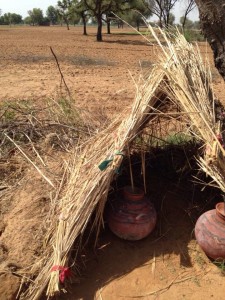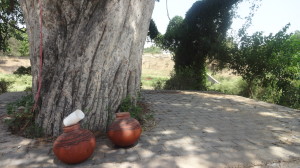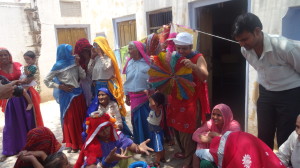Redirecting development: Some Lessons from 33rd Shodhyatra
Walking through the villages in Mahendragadh district, Haryana was
very reassuring in certain aspects and bewildering in other. We did
not come across even a single malnourished child in the villages
during the walk.
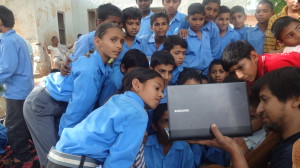
How could ithappen when many other states and
regions of Haryana itself have rampant malnutrition? The credit goes
to the mothers for breast feeding their children up to two and half
to three years. If no second child, then some mother breasts feed up
to five years in his years. There were also public write up on the
walls advocating breastfeeding of the infants. It is not for nothing
that so many of its youth sacrifice their life for the country.
Culturally the region was extremely hospitable and generous in its
treatment of strangers. Every 100 yards and sometimes lesser, there
were water pots for people to quench their thirst. I am sure similar
was the culture in different parts of the country in the past but
during our walk over last 17 years, we have not come across so much
concern for water for human as well as birds on the kutcha roads
connecting one village to another in any parts of the country.
Arjunbhai showed in every meeting the process of making a bird feeding
platform using old plastic bottles and plates. Gujarat also has many
more chabutaras in drier and less developed regions.
There were memorials for various soldiers who laid their lives for the
country. There has been a long tradition of youth from the region
joining defense services. This again was a unique feature which we had
not seen elsewhere with so much respect. Many people had built
sculptures of their grandparents to show their respect. There was not
any colour missing from the houses painted in purple, green blue, red
and greays.
We were struck by the depth and the breadth of the
political message that Modi had conveyed in the villages. On learning
that a large number of shodhyatrs came from Gujarat, some people
wondered whether the new government had started action so soon. We of
course had to clarify that this is part of our regular learning walks
during summer and winter. In summer, we went to places which were hot
and in the winter to the places which were cold. The idea of Honey
Bee Network of cross-pollinating the knowledge and innovation from one
part of the country to another did strike home to many.
I will talk

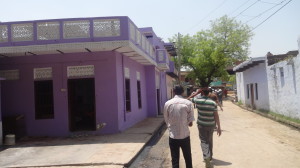
about various innovations and the practices that we came across next
week. Let me focus on some of the worrisome aspects of development.
Given the uniform charges for electricity, regardless of the actual
consumption, farmers use water very irresponsibly. In many places,
the water table has gone down to more than 1000 feet and the
drinkability of the water has come down also. Paradoxically, we did
not find any worthwhile rain water storage structure. In some places,
where attempts were indeed made, the quality of the work was so poor
that it was washed away within a single rain. In Vidharba of
Maharashtra, we noticed similar apathy for water conservation last
year. No lesson had been learned from regions which have had success
in this regard such as Saurashtra.
A very large number of young people of the region prefer to become
school teachers and the quality of education seemed reasonably good.
Students from government schools were generally well informed though
there was no shortage of private schools in the region. But surely,
the educational quality on many government schools can be improved.
Mandhana government school was an outstanding village where so many
ideas were received in the on the spot competition, many of these on
the edge of the technological imagination.
What are the lessons for the government from the grassroots? There
has to be a nation-wide campaign for educating women for breastfeeding
their infants for at least two years if we want to get rid of the
scourge of 50 per cent children malnourished in the country. This
will require a massive reorientation in the developmental priorities.
Without healthy children, the country cannot have a bright future.
We did come across vegetable gardens in several villages akin to the
practice found in Anantnag district, J&K, another region which has
very low infant malnutrition. In Gujarat and many other developed
states, it is very rare to find vegetable gardens in every household.
Judicious use of water is the need of the hour. Villagers are aware
that serious crisis is in the offing. In some villages, as against
122 wells a decade ago, hardly 25 were in operation. There did not
seem to be any policy consciousness on this account. This calls for
an urgent water and power conservation mission. It was tragic that a
developed stage of the country had so misaligned its priorities in
terms of liqour consumption. There were more liquor vending shops
than dispensaries or libraries. There is a need for empowering women
who had once succeeded in getting all the liquor shops closed in
Haryana. Their voices need to be heard. Women and watershed
development cannot be separated. New ideals need to shape new
preferences.
